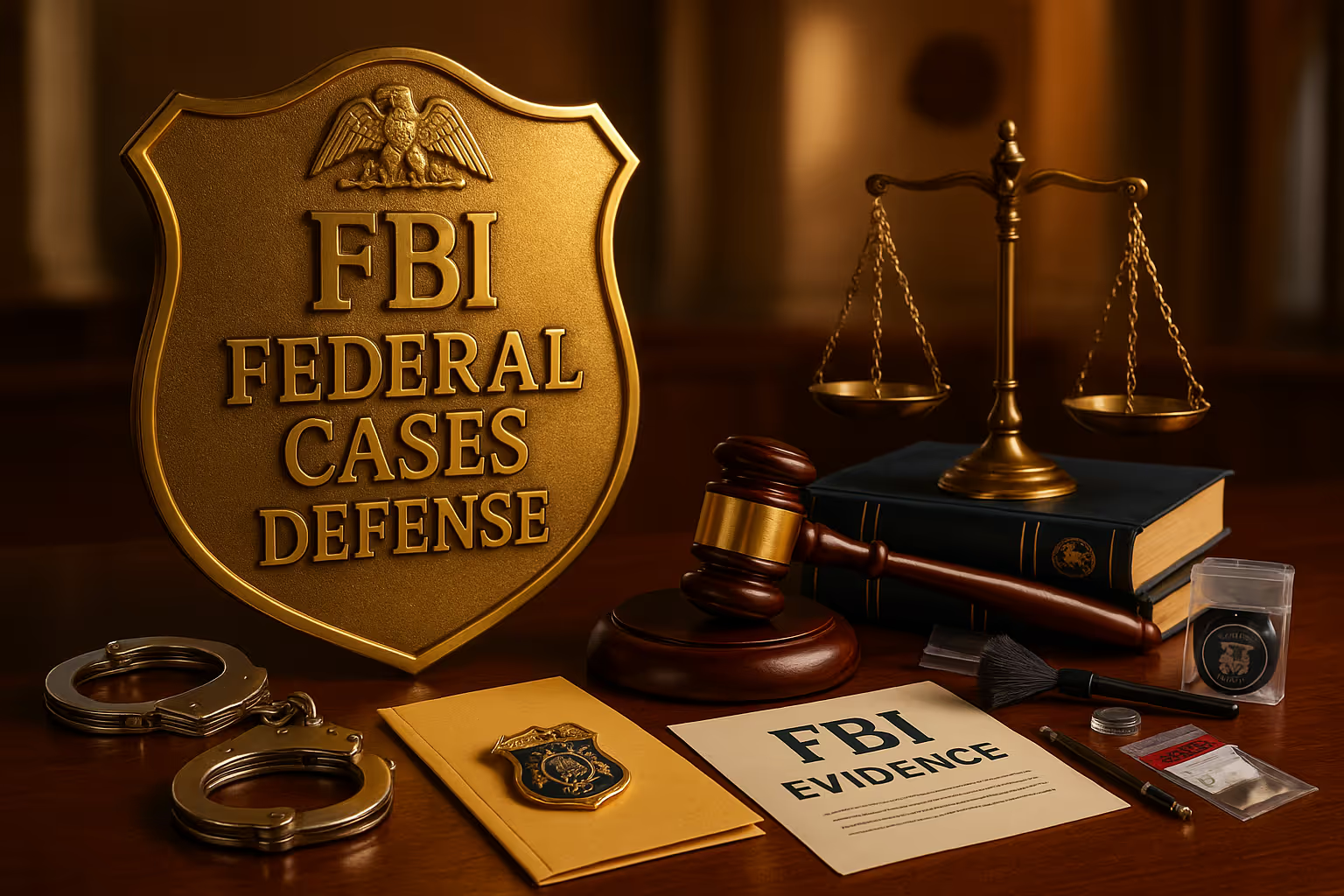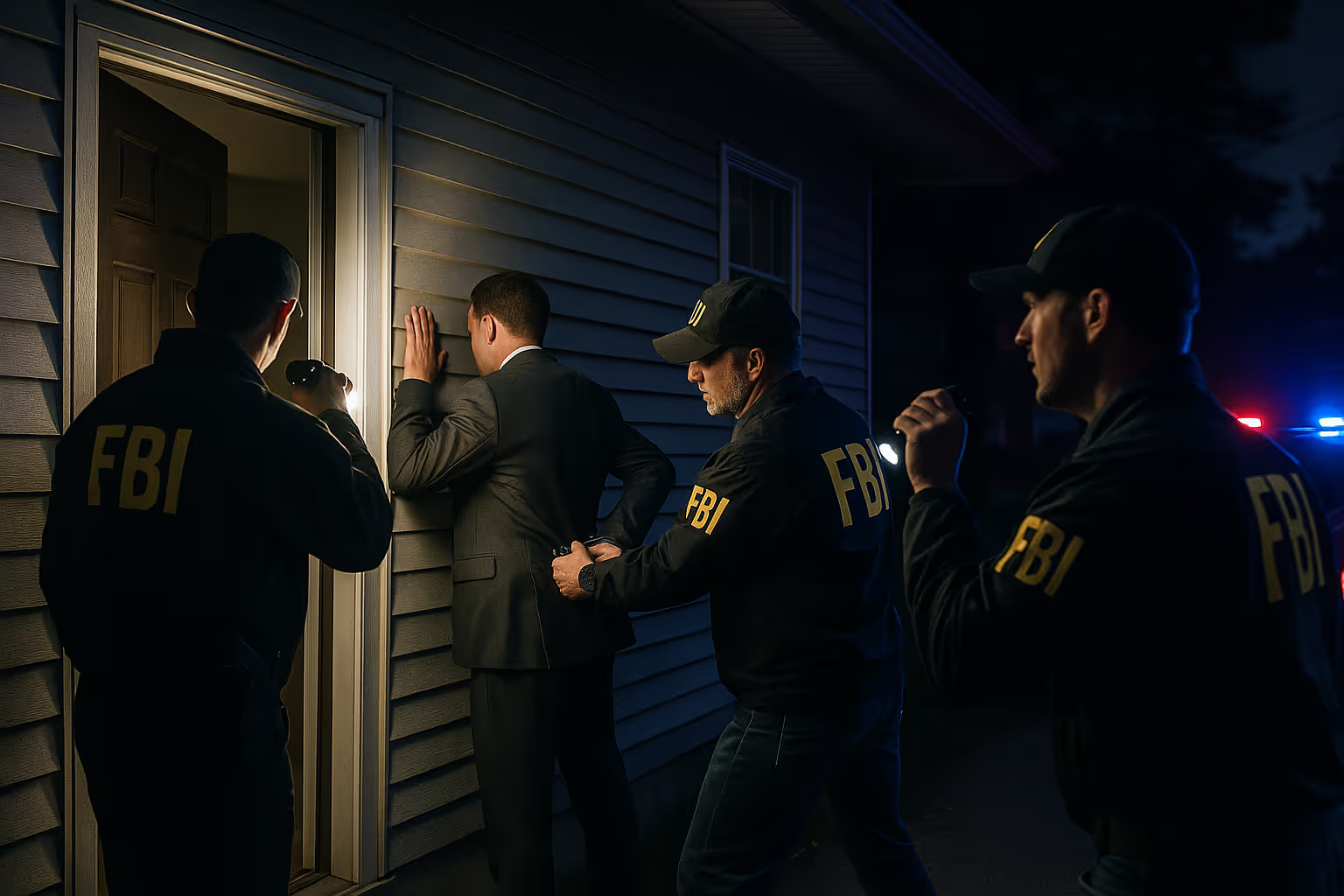ICE Arrests Are Increasing. Detained or facing deportation? We can help with bond hearings and removal defense.
ICE Arrests Are Increasing.
Learn More
Federal investigations conducted by the FBI carry immense stakes. Being targeted can lead to charges ranging from white-collar offenses like fraud and money laundering to serious crimes such as drug trafficking, cyberattacks, or national security violations. These cases are prosecuted under strict federal statutes and handled by seasoned trial teams at U.S. Attorney’s Offices. A single misstep, whether in responding to an FBI interview or executing search warrants, can jeopardize your freedom, reputation, and financial future.
If you’re under FBI scrutiny in San Gabriel or the surrounding areas, you need a defense team with deep federal experience on your side. At Perliss Law Firm, our attorneys have over 35 years of combined criminal and federal practice. We guide clients through every phase, from grand jury subpoenas to trial and appeal. We offer free, confidential consultations in English or Mandarin and develop a customized strategy to protect your rights at each turn. Contact Perliss Law Firm today to discuss your situation and learn how we can defend you against FBI federal charges.










An FBI investigation is not like a routine police inquiry. When the Bureau opens a case, it often operates under the radar, using sophisticated tools and wide-ranging authority. Investigations can be triggered by referrals from other law enforcement agencies, tips from whistleblowers or corporate compliance officers, or evidence of wrongdoing revealed in audits or regulatory filings. Once the FBI decides to investigate, its agents can conduct interviews, obtain grand jury subpoenas, and secure search warrants—actions that require a strong legal response.
Key aspects of an FBI investigation include:
The FBI must establish “predication,” a factual basis suggesting federal law may have been violated. This could come from a bank’s suspicious activity report, an internal corporate audit, or complaints from victims of cybercrime.
A preliminary inquiry allows agents to evaluate initial information. If they find sufficient evidence, the case moves to a full investigation, granting broader powers to issue subpoenas and warrants.
Agents use grand jury subpoenas to demand documents and testimony, execute search warrants at homes and offices, conduct electronic surveillance under the Foreign Intelligence Surveillance Act when applicable, and run undercover operations. Agents record witness interviews in FD-302 reports, which summarize statements for prosecution.
The FBI’s authority extends nationwide and often involves coordination with other federal agencies, such as the Securities and Exchange Commission, in fraud cases or the Drug Enforcement Administration in narcotics investigations.
Being the subject of an FBI inquiry can feel intimidating. Speaking with agents without counsel, even informally, can lead to misunderstandings or self-incrimination. It is critical to secure experienced federal defense representation as soon as you learn of any FBI interest in your activities. A knowledgeable attorney will monitor investigative progress, challenge improper subpoenas or searches, and ensure your rights are fully protected from the outset.
Federal law covers a broad spectrum of criminal conduct, and the FBI spearheads investigations into many of these offenses. Understanding the specific charges you may face is the first step in mounting an effective defense.
These non-violent offenses often involve financial schemes and typically fall under federal jurisdiction when the amounts exceed state thresholds or cross state lines. Examples include:
Large-scale narcotics cases usually involve multiple states or international borders. Federal charges can arise from:
The FBI investigates offenses that exploit electronic systems, including:
To maintain public trust, federal law targets abuses of power by government officials. Cases include:
The most serious FBI cases involve threats to national security. These prosecutions can include:
Each category of offense carries its own investigative challenges and statutory penalties. Federal charges often bring mandatory minimum sentences and strict sentencing guidelines, making specialized legal knowledge essential. In the next section, we will outline how the federal investigation and indictment process unfolds and highlight critical points where early defense intervention can make a decisive difference.

Federal cases often begin well before charges are ever filed. An investigation can span weeks, months, or even years as agents gather evidence, interview witnesses, and execute search warrants.
At a certain point, once they believe there is sufficient proof of wrongdoing, the government will present its case to a grand jury, seeking a formal indictment that transforms an inquiry into prosecution.
Key steps include:
Agents must establish a factual basis for investigation, often based on whistleblower tips, audit findings, or referrals from other agencies. A preliminary inquiry allows the FBI to collect initial documents and conduct interviews without a warrant.
Upon finding probable cause, agents obtain grand jury subpoenas to compel the production of records such as bank statements, emails, and phone logs. Witnesses may also be compelled to testify before the grand jury under oath.
When probable cause exists that evidence is located at a specific site, agents secure search warrants from a federal magistrate judge. These warrant-backed searches can include residences, offices, and electronic devices.
A panel of citizens reviews the government’s evidence in secret. The prosecutor presents witnesses and documents; the defense counsel does not participate in the proceedings. If at least 12 jurors agree there is probable cause, they issue an indictment, formally charging you with federal crimes.
Once returned, the indictment is unsealed, and you are arrested or served with an arrest warrant, which is then brought before a federal court for an initial appearance and arraignment.
Because the grand jury stage is one of the few points at which you cannot present your side of the story, early involvement of experienced federal defense counsel is critical. A skilled attorney can move to quash improper subpoenas or challenge search warrant affidavits before an indictment is returned, reducing or eliminating charges before your case ever reaches trial.
Federal cases brought by the FBI follow their own set of rules and procedures, distinct from those in California’s state courts. Understanding these differences is essential to navigating your defense and knowing what to expect when your case moves to the federal system.
State felony cases typically begin with a prosecutor’s complaint, whereas most federal offenses require a grand jury indictment. Before any charges become public, a federal prosecutor presents evidence to a panel of citizens, and at least twelve jurors must agree there is probable cause.
Federal law mandates broader discovery obligations under Rule 16 of the Federal Rules of Criminal Procedure. You are entitled to receive witness statements, expert reports, and certain Brady material—evidence favorable to the defense—well before trial. This level of transparency can be a double-edged sword, as both sides have significant time to build detailed cases.
In state court, many defendants are eligible for bail soon after arrest. Federal magistrate judges apply stricter standards, weighing factors such as the defendant’s community ties, criminal history, and potential flight risk. In serious federal matters—particularly those involving organized crime, terrorism, or large-scale drug trafficking—pretrial detention without bail is more likely.
California sentencing is governed by statutes that allow judicial discretion within statutory ranges. Federal sentences are driven by the U.S. Sentencing Guidelines, which assign offense levels and criminal history categories to calculate a recommended range of imprisonment. While these guidelines are advisory, judges rarely deviate without substantial justification.
Federal trials are held in the United States District Court for the Central District of California, typically in downtown Los Angeles or Santa Ana, for cases arising near San Gabriel. Federal juries must reach a unanimous verdict, and bench trials (before a judge only) are also an option. Federal rules strictly enforce deadlines for motions, filings, and pretrial conferences.
State convictions are appealed through the California Court of Appeals and the Supreme Court. Federal convictions follow a separate path to the U.S. Court of Appeals for the Ninth Circuit. Post-conviction relief uses the federal habeas corpus process, which has its own strict deadlines and procedural bars.
Navigating these federal-state differences requires a defense team well-versed in both systems. An attorney experienced in California state courts may face a steep learning curve in federal practice. At Perliss Law Firm, we combine deep knowledge of federal procedures with local insight, ensuring your defense is tailored to the unique demands of federal litigation.
Because the grand jury stage is one of the few points at which you cannot present your side of the story, early involvement of experienced federal defense counsel is critical. A skilled attorney can move to quash improper subpoenas or challenge search warrant affidavits before an indictment is returned, reducing or eliminating charges before your case ever reaches trial.

Defending against FBI-led federal charges requires a blend of procedural challenges, strategic negotiations, and rigorous factual analysis. Early intervention can shape the investigation, restrict the evidence the government can use, and position you for the most favorable outcome possible.
Key strategies include:
File motions to suppress evidence obtained through flawed search warrants, overbroad grand jury subpoenas, or unauthorized electronic surveillance. Excluding critical evidence can force the government to narrow or drop charges against the accused.
Engage the U.S. Attorney’s Office early to highlight mitigating factors, such as minimal involvement, cooperation, or a clean record, and seek reduced counts or lower sentencing exposure through a negotiated agreement.
Move to dismiss defective indictments, sever prejudicial co-defendant cases, or compel disclosure of Brady material that the prosecution must share. These motions can reshape the trial landscape in your favor.
In white-collar matters, audit trails may reveal gaps in the narrative of fraud. In cybercrime cases, expert testimony can show that your conduct falls outside the statute’s scope. Tailoring defenses to the specific charges undermines the government’s theory.
Work with forensic accountants, computer experts, and private investigators to reconstruct evidence, such as financial transactions, email logs, or cell tower data, and identify witnesses whose accounts challenge the prosecution’s version of events.
By combining these approaches, a seasoned federal defense team can limit the government’s leverage, reduce potential penalties, and, in many instances, secure dismissals or favorable plea outcomes. At Perliss Law Firm, our over 35 years of federal practice experience ensure that every avenue of defense is explored and executed precisely.

Federal offenses prosecuted by the FBI carry distinct sentences set by statute and guided by the U.S. Sentencing Guidelines. Many crimes include mandatory minimum prison terms, while the guidelines establish a recommended range based on offense severity and criminal history. Below are examples of potential prison terms for common federal charges:
Maximum of 20 years imprisonment, with fines up to $250,000 for individuals (or twice the gain/loss amount).
Up to 20 years imprisonment, plus fines up to $500,000 or twice the value of the property involved.
A mandatory minimum of 2 years consecutive to any other sentence is imposed, with a maximum of 5 years.
Depends on the controlled substance and quantity:
• 5- to 40-year mandatory range for trafficking 500 grams of cocaine or 5 grams of methamphetamine.
• Life imprisonment for trafficking larger quantities or prior drug convictions.
• Illegal possession of a firearm in connection with a drug trafficking crime: Up to 10 years
• Use of a firearm in the commission of a violent felony: Up to 20 years
Bribery of public officials carries up to 15 years imprisonment and substantial fines.
Unauthorized access to protected computers can result in up to 10 years, depending on the harm caused.
In addition to the mandatory minimum sentences, the Sentencing Guidelines also set recommended sentence ranges based on the following factors:
The offense level is a base number set by law, which may be increased by enhancements such as a leadership role and decreased by reductions for acceptance of responsibility.
The criminal history category ranges from I to VI, with Category I reflecting minimal prior convictions and Category VI reflecting multiple serious felonies.
The guideline range is determined by cross-referencing your offense level and criminal history category on a sentencing table to produce a recommended prison term in months.
Judges have the discretion to sentence below that range for extraordinary circumstances, such as severe health issues, or to reduce a sentence post-conviction if you provide substantial assistance under Rule 35.
In addition to imprisonment, financial penalties may include fines, victim restitution, and forfeiture of assets connected to the crime.
A defense attorney works to lower your offense level, place you in a favorable history category, and argue for any reductions, cutting prison time and financial exposure.
A federal defense attorney brings specialized knowledge of complex statutes, rules, and procedures that do not apply in state court. They know how to challenge grand jury subpoenas, suppress improperly obtained evidence, and negotiate effectively with powerful U.S. Attorney’s offices. Without experienced counsel, you risk missing critical procedural deadlines or underestimating the impact of mandatory minimum sentences. A skilled federal lawyer levels the playing field and safeguards your constitutional rights at every stage.

When facing FBI federal charges, you need a defense team that combines deep federal experience with local insight. At Perliss Law Firm, we provide comprehensive support at every stage of your case.
Our former prosecutor background gives us a clear understanding of how the U.S. Attorney’s Office builds cases, allowing us to anticipate and counter their strategies.
We work with private investigators to gather and analyze critical evidence, from financial records and electronic data to witness statements and surveillance footage.
We retain top forensic specialists—including computer crime analysts, financial auditors, and ballistics experts—to challenge the government’s technical proofs.
We pursue dismissals or reduced charges through targeted motions and, if necessary, present a powerful defense at trial, protecting your rights and minimizing potential penalties.
Fluent in English and Mandarin, our attorneys ensure clear communication throughout the process and keep you fully informed of developments.
From the first interview through appeals, we tailor our strategy to your circumstances and stand ready to defend you against the full force of a federal prosecution.
If the FBI reaches out, do not speak to agents without first consulting an attorney. You have the right to remain silent and to have counsel present during any questioning. Politely decline to answer questions until your lawyer can advise you on your rights and the best approach.
You may assert your Fifth Amendment right against self-incrimination and refuse to testify. Your attorney can guide you on when it is lawful and strategic to take that stance and can help negotiate immunity or other protections if testifying becomes necessary.
The timeline varies, but most federal investigations and prosecutions last from several months to two years. Complex cases involving multiple defendants, appeals, or extensive forensic analysis can extend beyond that range. Your attorney will provide a case-specific estimate and update you as the matter progresses.
Federal detention standards are stricter than those in state court. You may file a motion for bail at your initial appearance, but eligibility depends on factors such as criminal history, community ties, and flight risk. An experienced attorney can argue for reasonable conditions of release and present evidence of your stability and community support.
Given the harsh penalties and lasting impact of a federal offense, it's essential to seek legal counsel to explore all possible defenses and mitigate potential consequences.

If you are under FBI scrutiny or facing federal charges in San Gabriel or anywhere in Los Angeles County, do not delay securing experienced defense counsel. Perliss Law Firm offers free, confidential case evaluations in English or Mandarin.
Reach out today to safeguard your rights and begin building your strongest defense. We serve clients across San Gabriel and surrounding areas, including Los Angeles County and Riverside County.
